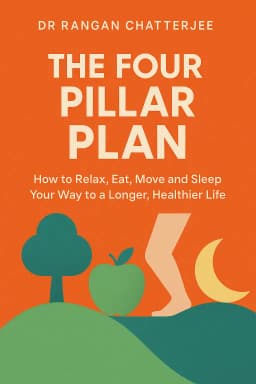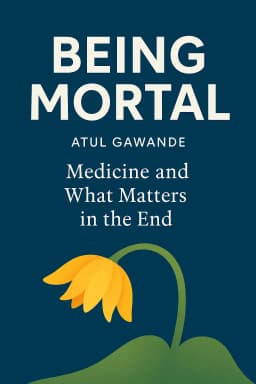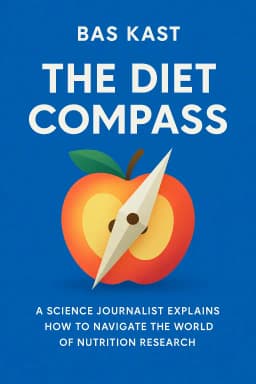
Engineering Your 'Outlive' Blueprint: A Tech Mastermind's Guide to Longevity
Golden Hook & Introduction
SECTION
Socrates: Imagine you're in a recurring nightmare. You're running around a city, desperately trying to catch eggs falling from a skyscraper. You get better at catching them, your basket is padded, your technique is perfect... but they never, ever stop falling. This isn't just a dream; it's a metaphor for our entire approach to modern medicine.
Portia: That’s a powerful image. It’s immediately stressful.
Socrates: It is. And it's the central challenge posed by Dr. Peter Attia in his book 'Outlive.' He argues we’re all just getting better at catching the eggs, not stopping the person throwing them. Today, with our guest Portia, whose background in technology and systems thinking makes her the perfect person for this conversation, we're going to dive deep into Attia's solution from three perspectives.
Portia: I’m excited. It already sounds like a design problem.
Socrates: Exactly. First, we'll explore the need for a new health 'operating system' called Medicine 3.0. Then, we'll discuss how to build your personal strategy with a concept called the Centenarian Decathlon. And finally, we'll focus on the most crucial, yet often ignored, variable in the entire system: our emotional health. So Portia, as someone who builds and analyzes complex systems, what does that 'falling eggs' problem sound like to you?
Deep Dive into Core Topic 1: Medicine 3.0: Upgrading Your Health Operating System
SECTION
Portia: It sounds like pure firefighting. It’s a reactive model. In tech, this is what happens when you have legacy code full of bugs. You spend all your time patching vulnerabilities and responding to crashes, but you never step back to re-architect the system itself. It's inefficient, it's unsustainable, and you're always one step behind the next disaster. You’re not addressing the root cause.
Socrates: Precisely. You're not addressing the root cause. And that, in a nutshell, is Attia's critique of what he calls 'Medicine 2.0.' This is the medicine of the last century. It’s brilliant at what it does—it gave us antibiotics, sanitation, incredible surgeries. It’s great at treating acute problems, the 'fast deaths' from infection or trauma. But it’s failing spectacularly against the 'slow deaths'—the chronic diseases that now kill most of us.
Portia: You mean things like heart disease, cancer, diabetes...
Socrates: Exactly. The Four Horsemen, as he calls them: heart disease, cancer, neurodegenerative disease, and type 2 diabetes. Medicine 2.0 waits until the egg is already falling—until the tumor is detectable or the artery is clogged—and then tries to catch it. Attia argues for a fundamental upgrade to 'Medicine 3.0,' a proactive, preventative, and deeply personalized approach. It’s about stopping the guy on the roof from ever throwing the eggs.
Portia: So it's a shift from a bug-fix model to a secure-by-design architecture. I like that. But what does that look like in practice? It sounds great, but it also sounds abstract.
Socrates: That's the key question. It’s about having a strategy, not just a collection of tactics. We all know the tactics: eat well, exercise, sleep. But without a strategy, they're just noise. Attia uses a fantastic story to illustrate this. Do you remember the 'Rumble in the Jungle'?
Portia: Vaguely. Muhammad Ali versus George Foreman, right? Foreman was the huge favorite.
Socrates: He was an unstoppable force. Younger, stronger, a knockout machine. Everyone expected Ali to lose, and lose badly. A purely tactical approach for Ali would have been to go toe-to-toe, punch for punch. He would have been destroyed. But Ali had a strategy. He knew Foreman was hotheaded and had questionable stamina.
Portia: The rope-a-dope.
Socrates: The rope-a-dope! That was the tactic, but the strategy was bigger:. Ali leaned on the ropes, protected his head, and let Foreman wail on his body for seven rounds. Foreman got angrier, more frustrated, and completely exhausted. In the eighth round, Ali came off the ropes and knocked him out. He won because his strategy exploited his opponent's weakness. The tactics served the strategy, not the other way around.
Portia: That’s a brilliant analogy. So, in the context of health, we're often just throwing tactical punches—a new diet, a new workout class—without a real, overarching strategy for what we're trying to achieve. We're fighting Foreman head-on.
Socrates: We are. We're confusing the noise of tactics with the clarity of strategy. So, if Ali's strategy was to win the fight, what's our strategy for longevity? It's not just 'live longer.' Attia proposes a much more concrete objective.
Deep Dive into Core Topic 2: The Centenarian Decathlon: Your Personal Longevity Strategy
SECTION
Socrates: He calls it the 'Centenarian Decathlon.' Portia, before I explain, what does that phrase evoke for you?
Portia: It immediately makes it goal-oriented and measurable. A decathlon isn't one event; it's ten. It implies a need for versatile, functional fitness, not just being good at one thing. And 'Centenarian' sets the timeframe. It sounds like you need to define the specific events, or capabilities, you want to have at age 100, and then reverse-engineer your training plan from there.
Socrates: You've just perfectly reverse-engineered his concept. That's exactly it. The objective isn't to be a world-class marathoner at 85. The objective is to define a list of maybe ten to fifteen physical and cognitive tasks that are critical to your quality of life, and that you want to still be able to do in your final decade.
Portia: Like what, specifically?
Socrates: It's deeply personal. For him, it includes things like: being able to pick up his great-grandchild from the floor. Being able to put a 30-pound suitcase in an overhead bin. Being able to walk up three flights of stairs without being winded. Having a sharp, engaging conversation. These become the 'events' in your personal decathlon. You then have to ask the hard question: to be able to do that at 90, what do I need to be able to do at 70? At 50? At 30?
Portia: Wow. That completely reframes the purpose of exercise. It’s no longer an abstract chore to 'be healthy' or 'lose weight.' It becomes a very specific training program for a future, desired state. It's like defining your end-state requirements for a product. You can't build it if you don't know what it's supposed to do.
Socrates: And the book gives a heartbreaking example of what happens when you don't have this strategy. He tells the story of his friend's mother, Sophie. She was vibrant and active into her seventies, loved gardening and golf. But then she had a minor fall, tore a muscle in her shoulder. That made it hard to play golf. The inactivity led to back pain. Then she fell again, hurt her knee. She became more sedentary, depressed, and within a few years, she had developed dementia and passed away. A small crack in her physical stability cascaded into a total system failure.
Portia: Because she didn't have the physical reserves. She was living on the margin. That one injury pushed her over the edge.
Socrates: Exactly. She wasn't training for her decathlon. She didn't have the strength and stability to absorb that 'punch.' This strategy is about building a buffer, so that the inevitable setbacks of aging don't become catastrophic. But here's the twist. You can have the perfect strategy, the best tactics, a flawless training plan... and the whole system can still crash. Attia learned this the hard way.
Deep Dive into Core Topic 3: The Unseen Variable: The ROI of Emotional Health
SECTION
Socrates: This is perhaps the most powerful and unexpected part of the book. For years, Attia was the poster boy for physical optimization. He was a surgeon, a data-driven analyst, obsessed with hacking his biology for a longer life. But inwardly, he was, in his own words, a wreck. He was driven by a relentless, angry ambition that was poisoning his relationships and making him miserable.
Portia: He was optimizing the hardware but ignoring the software.
Socrates: A perfect way to put it. The breaking point came when he was at the peak of his professional life. He was a successful physician, a sought-after consultant. But he was so emotionally detached that he was destroying his family. His therapist finally asked him a question that stopped him in his tracks. She said, "Peter, why would you want to live longer if you’re so unhappy?"
Portia: That's a system-halting question. It invalidates the entire premise of his project. The 'what' of longevity is meaningless without the 'why'.
Socrates: It forced him to confront that his obsession with longevity wasn't about a love of life; it was about a fear of death. And he had to go on a painful, difficult journey to address his emotional health, his past traumas, and his destructive patterns. He realized that emotional well-being isn't a 'soft' skill or a luxury. It is a core pillar of healthspan. This feels like the ultimate 'human factor' in a system. In tech, we talk about user experience and human-computer interaction. How do you see this emotional component fitting into a logical, data-driven framework for longevity?
Portia: I see it as the system's core vulnerability. In high-performance fields like tech, we see burnout all the time. People optimize their productivity, their skills, their careers... but they neglect their mental and emotional health. And eventually, they crash. The most brilliant engineer is useless if they're too anxious or depressed to function. So, from a systems perspective, ignoring your emotional health isn't logical; it's a critical design flaw. You're leaving your most important component completely unmonitored and unmaintained. It's guaranteed to fail.
Socrates: A critical design flaw. I love that. Attia had to learn to build tools for his emotional health just as rigorously as he built tools for his physical health. He had to learn to manage his own internal 'software.'
Synthesis & Takeaways
SECTION
Socrates: So, when we put it all together, it's a remarkably coherent and powerful vision. We need a new operating system, this 'Medicine 3.0,' that's proactive and personalized.
Portia: And within that OS, we need a clear, long-term strategy, which the Centenarian Decathlon provides. It gives us our 'why.'
Socrates: And underpinning all of it, we have the non-negotiable, critical software of emotional health. Without it, the rest of the system is built on sand.
Portia: It seems the book leaves us with a powerful question. It's not just 'how do I live longer?' but 'what am I living for?' So the real takeaway isn't a new diet or a specific workout. It's a new question to ask yourself: What would be on the list for Centenarian Decathlon? What's the future you're training for, right now?
Socrates: A perfect place to end. Portia, thank you. This has been incredibly insightful.
Portia: Thank you, Socrates. It’s given me a lot to think about.









